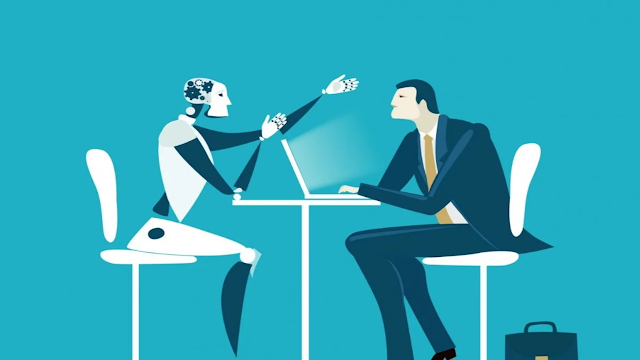- Get link
- X
- Other Apps
- Get link
- X
- Other Apps
We live in an era in which the cognitive ability of machines is taking on new flights. With the increasing precision of data analysis, the use of intelligent algorithms impacts the way all business areas operate, including when it comes to people management. Whether in a decision on hiring or granting bonuses, the use of artificial intelligence in HR is already a happy reality in some organizations.
Until recently, the main benefits of HR technology were to improve efficiency and reduce costs by automating repetitive tasks. Today, advances, such as artificial intelligence, allow people, management teams, to solve critical business challenges, promoting team performance improvements, and helping companies' profitability indicators.
Artificial intelligence is fueling the transition from administrative to strategic HR. See the main benefits of adopting this technology and what are the current challenges of implementing data science in people management.
Which is?
Artificial intelligence (AI) is technology as "intelligence similar to human displayed by mechanisms or software", in addition to being a field of academic study.
In practice, they are machines that imitate human intelligence to perform cognitive functions and solve problems through interaction, visual perception, learning, reasoning, natural language processing, and planning.
In short, AI can be used whenever tasks require a logical behavior based on data analysis that can be structured (spreadsheets, database) or unstructured (dialogues, photos) for taking strategic actions.
But what makes this technology so special for business? Three main components highlight the use of artificial intelligence in HR:
- High computational speed;
- Ability to analyze data and advanced algorithms when compared to common software;
- Greater precision and stability of daily processes through an algorithm that connects quality data with fast computation.
What is the impact of artificial intelligence on HR?
The success of any organization depends on how it effectively combines people, processes, and technology in an intelligent way to provide transformational value at an optimized cost. This is the scenario provided by artificial intelligence that helps to efficiently automate many administrative functions in the HR area and provides key indicators for decision making.
The acquisition of the technology, by itself, will not solve all the problems, but it will allow HR to transfer the time spent on repetitive and administrative tasks to strategic approaches.
Instead of a recruiter, for example, wasting time analyzing a series of resumes that are unrelated to the vacancy, he can discuss developing the candidate's experience or improving internal processes, gaining efficiency in the process when recruiting with AI.
Remembering that having more qualified candidates from the beginning reduces efforts in the recruitment and selection process, allowing managers to dedicate more time to the strategy.
In summary, the benefits of implementing artificial intelligence in HR are:
- Reducing the bureaucratic burden by automating processes, freeing HR professionals to focus on strategic organizational planning;
- Providing accurate data for quick decision making in R&S;
- Helps in measuring the return on investments in diverse ecosystems in the area of talent management;
- Reduction of bias in decision making.
How to apply?
Artificial intelligence in HR can be applied to all ecosystems. Data analysis and process automation can help a business partner to decide the profile of the next contract for the area.
The tool can also indicate, for those working with organizational development, which is the best investment in training according to the market indicators, and so on.
In short, in terms of business and HR, artificial intelligence in HR has the ability to improve almost all sectors and virtually all business functions and operations, helping employees to make crucial decisions based on the analysis.
But if there are so many benefits, what prevents organizations from using AI to manage their talents?
At first, there is a financial barrier, but, as highlighted by a survey by EY, this is not the main gap for the use of artificial intelligence. See what companies list as barriers to technology acquisition:
- Talent gap: it can be expensive and difficult to find people with the right education or skill.
- Concern about privacy: confidential HR data must be securely accessed and available only to authorized persons.
- Continuous maintenance: as with other innovative technologies, the use of artificial intelligence in HR requires deep learning and regular review and updates.
- Integration features: data availability is limited, due to the HR trend towards Software as a Service (SAAS).
However, despite the barriers presented, the adoption of artificial intelligence in HR is at an accelerated pace, given the benefits.
Find the best HRMS Software for effective HR management.
There is no data on acquisition specifically in people management, but as it is an essential tool for strategic HR, the adoption curve tends to be accelerated.
- Get link
- X
- Other Apps

Comments
Post a Comment